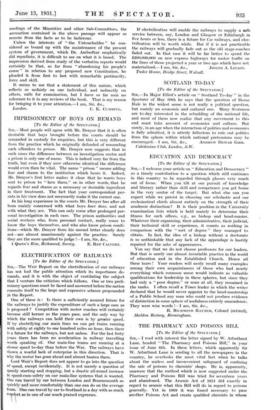EDUCATION AND DEMOCRACY
[To the Editor of the SPECTATOR.] Sm,—I welcome your article on " Education and Democracy " as a timely contribution to a question which still continues in this country to be regarded through glasses very much out of focus. When you tilt at our pursuit of knowledge and literacy rather than skill and competence you get home in the very centre of the target. But what else can you expect while we persist in choosing our scholastic and our ecclesiastical chiefs almost entirely on the strength of their academic distinction ? It is their position in the University examination lists which is held mainly to determine their fitness for such offices, e.g., as bishop and head-master. Whatever their organizing, their administrative, their judicial, their technical skill or experience, it counts as nothing in comparison with the " sort of degree " they managed to obtain. In fact, the idea of a bishop without a doctorate is so unthinkable that any lack of the appendage is hastily repaired for the sake of appearances.
You say that we do not choose professors for our leaders. But that is surely our almost invariable practice in the world of education and in the Established Church. Hence all these tears ! Your readers will easily recall many examples among their own acquaintances of those who had nearly everything which common sense would indicate as valuable qualifications for leadership in these spheres, but since they had only a poor degree," or none at all, they remained in the ranks. I often recall a Times leader in which the writer declared that he would never appoint to the head-mastership of a Public School any man who could not produce evidence of distinction in some sphere of usefulness entirely unacademic. They were wise words !—I am, Sir, &c.,






































 Previous page
Previous page